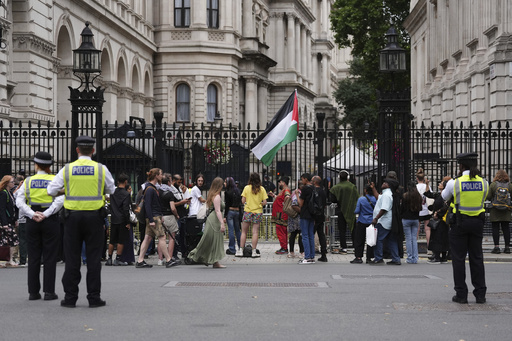In a significant political shift, Britain has announced plans to recognize a Palestinian state by September, provided Israel takes specific actions to address the ongoing conflict. This includes halting settlement expansions in the West Bank and committing to a ceasefire in Gaza, along with endorsing a two-state solution.
This announcement closely follows France’s decision to recognize Palestinian statehood during the upcoming United Nations General Assembly. While over 140 countries have already acknowledged Palestine as a state, Britain and France’s involvement holds particular weight due to their memberships in the Group of Seven and the U.N. Security Council. Both nations aim to exert diplomatic pressure on Israel, encouraging resolution to the humanitarian crisis in Gaza and revitalizing the stagnant peace process.
British Prime Minister Keir Starmer voiced that the U.K. will formally recognize a Palestinian state unless Israel makes notable efforts to ameliorate the dire situation in Gaza. Key conditions include allowing the U.N. to resume aid deliveries and unequivocally opposing further annexation in the West Bank. Despite these prerequisites, Starmer maintained that Hamas must cease its aggression and release hostages, though these demands aren’t tied to recognition.
The U.K.’s position has traditionally supported the vision of an independent Palestinian state existing peacefully alongside Israel, contingent upon a comprehensive peace plan. However, increasing concerns are mounting that such a peace prospect is diminishing. Prolonged conflicts have devastated Gaza, exacerbated by Israel’s continued settlement expansion in the West Bank, an action widely seen as illegal by the international community.
Heidi Alexander, a Cabinet minister, emphasized that “the moment to act is now,” referencing the effective annexation of the West Bank. Domestically, pressure is rising on Starmer’s government, driven by public and political reproach over the humanitarian crisis in Gaza. A significant number of Members of Parliament have pushed for immediate recognition of Palestinian statehood, reflecting public opinion favoring the move.
Israel has reacted strongly against Britain’s decision. Prime Minister Benjamin Netanyahu expressed that the U.K.’s stance “rewards Hamas’s terrorism.” Families of Israeli hostages echoed this sentiment, suggesting that such recognition could incentivize further violence. Alternatively, the Palestinian Authority applauded Britain’s commitment, viewing it as a step toward rectifying historical injustices stemming from over a century of dispossession.
Despite the symbolism, Britain’s tangible influence over Israel remains limited, with past measures like suspending certain arms shipments already in place. However, the nation holds historical significance in the region and asserts a moral responsibility, as the former colonial power, to aid in resolving ongoing conflicts. Foreign Secretary David Lammy asserted Britain’s special duty, linked to its historical role in the region.
While Starmer’s statement has received varied domestic reactions, it has also inspired neighboring countries, like Malta, to contemplate similar actions. Nonetheless, influential states like Germany remain cautious, underscoring recognition should align with a formal peace process rather than occur preemptively. Real advancements hinge on U.S. engagement, leaving future developments uncertain. President Donald Trump and the U.S. administration have thus far offered a tepid response.
As diplomatic dynamics unfold, experts acknowledge international majority support for Palestinian statehood. However, actualizing statehood requires broader international consensus, with pivotal decisions resting on the U.N. Security Council—an unlikely prospect without concerted U.S. backing.


